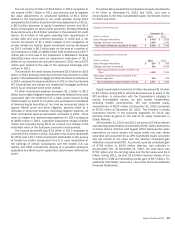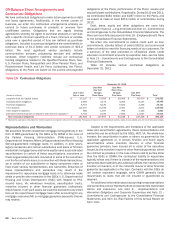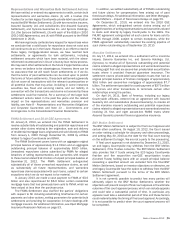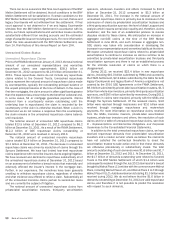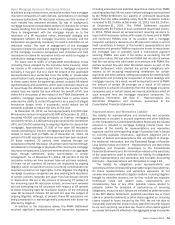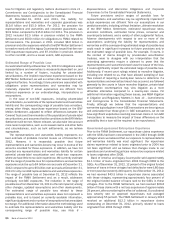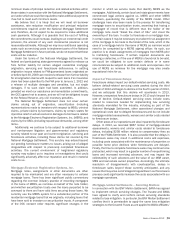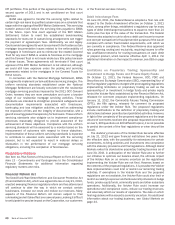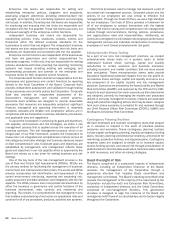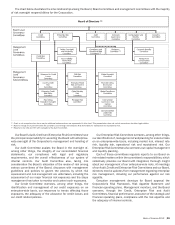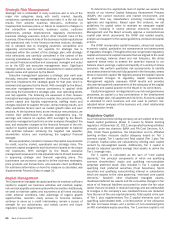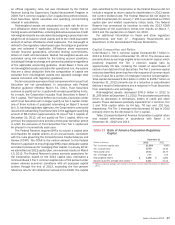Bank of America 2012 Annual Report Download - page 61
Download and view the complete annual report
Please find page 61 of the 2012 Bank of America annual report below. You can navigate through the pages in the report by either clicking on the pages listed below, or by using the keyword search tool below to find specific information within the annual report.Bank of America 2012 59
minimum levels of principal reduction and related activities within
those states in connection with the National Mortgage Settlement,
and under which we could be required to make additional payments
if we fail to meet such minimum levels.
We believe that it is likely that we will meet all borrower
assistance, rate reduction modification and principal reduction
commitments required under the National Mortgage Settlement
and, therefore, do not expect to be required to make additional
cash payments. Although it is possible that the cost of fulfilling
the commitments could increase, leading to an incremental credit
provision, the amount of any such incremental provision is not
reasonably estimable. Although we may incur additional operating
costs such as servicing costs to implement parts of the National
Mortgage Settlement in future periods, we do not expect that those
costs will be material.
Under the terms of the National Mortgage Settlement, the
federal and participating state governments agreed to release us
from further liability for certain alleged residential mortgage
origination, servicing and foreclosure deficiencies. In settling
origination issues related to FHA-guaranteed loans originated on
or before April 30, 2009, we received a release from further liability
for all origination claims with respect to such loans if an insurance
claim had been submitted to the FHA prior to January 1, 2012 and
a release of multiple damages and penalties, but not single
damages, if no such claim had been submitted. In addition,
provided we meet our assistance and remediation commitments,
the OCC agreed not to assess, and we will not be obligated to pay
to the Federal Reserve, any civil monetary penalties.
The National Mortgage Settlement does not cover certain
claims arising out of origination, securitization (including
representations made to investors with respect to MBS), criminal
claims, private claims by borrowers, claims by certain states for
injunctive relief or actual economic damages to borrowers related
to the Mortgage Electronic Registration Systems, Inc. (MERS), and
claims by the GSEs (including repurchase demands), among other
items.
Additionally, we continue to be subject to additional borrower
and non-borrower litigation and governmental and regulatory
scrutiny related to our past and current origination, servicing and
foreclosure activities, including those claims not covered by the
National Mortgage Settlement. This scrutiny may extend beyond
our pending foreclosure matters to issues arising out of alleged
irregularities with respect to previously completed foreclosure
activities. The current environment of heightened regulatory
scrutiny may subject us to inquiries or investigations that could
significantly adversely affect our reputation and result in material
costs to us.
Mortgage Electronic Registration Systems, Inc.
Mortgage notes, assignments or other documents are often
required to be maintained and are often necessary to enforce
mortgage loans. There has been significant public commentary
regarding the common industry practice of recording mortgages
in the name of MERS, as nominee on behalf of the note holder,
and whether securitization trusts own the loans purported to be
conveyed to them and have valid liens securing those loans. We
currently use the MERS system for a substantial portion of the
residential mortgage loans that we originate, including loans that
have been sold to investors or securitization trusts. A component
of the OCC consent order requires significant changes in the
manner in which we service loans that identify MERS as the
mortgagee. Additionally, certain local and state governments have
commenced legal actions against us, MERS and other MERS
members, questioning the validity of the MERS model. Other
challenges have also been made to the process for transferring
mortgage loans to securitization trusts, asserting that having a
mortgagee of record that is different than the holder of the
mortgage note could “break the chain of title” and cloud the
ownership of the loan. In order to foreclose on a mortgage loan,
in certain cases it may be necessary or prudent for an assignment
of the mortgage to be made to the holder of the note, which in the
case of a mortgage held in the name of MERS as nominee would
need to be completed by a MERS signing officer. As such, our
practice is to obtain assignments of mortgages from MERS prior
to instituting foreclosure. If certain required documents are
missing or defective, or if the use of MERS is found not to be valid,
we could be obligated to cure certain defects or in some
circumstances be subject to additional costs and expenses. Our
use of MERS as nominee for the mortgage may also create
reputational risks for us.
Impact of Foreclosure Delays
Foreclosure delays impact our default-related servicing costs. We
believe default-related servicing costs peaked during the third
quarter of 2012 and began to decline in the fourth quarter of 2012,
and we anticipate that this decline will accelerate in 2013.
However, unexpected foreclosure delays in 2013 could impact the
rate of decline. Default-related servicing costs include costs
related to resources needed for implementing new servicing
standards mandated for the industry, including as part of the
National Mortgage Settlement, other operational changes and
operational costs due to delayed foreclosures and do not include
mortgage-related assessments, waivers and similar costs related
to foreclosure delays.
Other areas of our operations are also impacted by foreclosure
delays. In 2012, we recorded $867 million of mortgage-related
assessments, waivers and similar costs related to foreclosure
delays, including $258 million related to compensatory fees as
part of the FNMA Settlement. It is also possible that the delays in
foreclosure sales may result in additional costs and expenses,
including costs associated with the maintenance of properties or
possible home price declines while foreclosures are delayed.
Finally, the time to complete foreclosure sales may continue to be
protracted, which may result in a greater number of nonperforming
loans and increased servicing advances, and may impact the
collectability of such advances and the value of our MSR asset,
MBS and real estate owned properties. Accordingly, the ultimate
resolution of disagreements with counterparties, delays in
foreclosure sales beyond those currently anticipated, and any
issues that may arise out of alleged irregularities in our foreclosure
process could significantly increase the costs associated with our
mortgage operations.
Mortgage-related Settlements – Servicing Matters
In connection with the BNY Mellon Settlement, BANA has agreed
to implement certain servicing changes. The Trustee and BANA
have agreed to clarify and conform certain servicing standards
related to loss mitigation. In particular, the BNY Mellon Settlement
clarifies that it is permissible to apply the same loss mitigation
strategies to the Covered Trusts as are applied to BANA affiliates’


